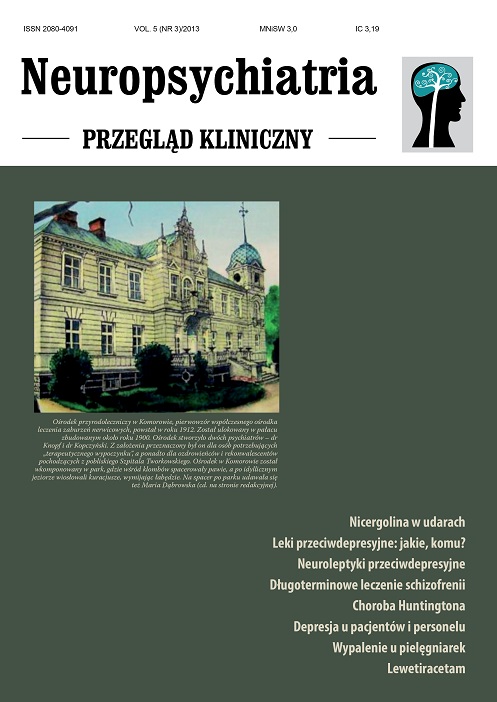Antidepressants’ administration in relation to patients’ clinical profiles Review article
Main Article Content
Abstract
Although the history of pharmacotherapy of depression started in the fifties of the twentieth century, we are still struggling with this disabling function disease. It is difficult to choose only one wonder drug of the antidepressants’ class. Each depression and every person are different and require different therapeutic approach. The most useful for all practitioners is to understand the mechanisms of pharmacological action and sharing our clinical experiences. The nowadays market leaders are undoubtfully the SSRI class antidepressants. Their high efficacy, safety profile and a wide range of indications cause that these are the drugs we prescribe the most often.
Article Details

This work is licensed under a Creative Commons Attribution-NonCommercial-NoDerivatives 4.0 International License.
Copyright: © Medical Education sp. z o.o. License allowing third parties to copy and redistribute the material in any medium or format and to remix, transform, and build upon the material, provided the original work is properly cited and states its license.
Address reprint requests to: Medical Education, Marcin Kuźma (marcin.kuzma@mededu.pl)
References
2. Tylee A. Depression in Europe: experience from the DEPRES II survey. Depression Research in European Society. Eur Neuropsychopharmacol 2000; 10(supl 4): 445-448.
3. Dróżdż W, Wojnar M, Araszkiewicz A et al. Badanie rozpowszechnienia zaburzeń depresyjnych u pacjentów podstawowej opieki zdrowotnej w Polsce. Wiadomości Lekarskie 2007; LX: 3-4.
4. Angst J, Angs F, Stossen HM. Suicide risk in patients with major depressive disorders. J Clin Psychiatry 1999; 60(supl 2): 57-62.
5. Olie JP, Costa JA, Silva E, Marcher JP. Neuroplasticity. A new approach to the pathophysiology of depression. Science Press Ltd; London 2004: 25-35.
6. Chrousos GP. The role of stress and the hypothalmic-pituitaryadrenal axis in the pathogenesis of the metabolic syndrome: neuro-endocrine and target tissue-related causes. Int J Relat Metab Disord 2000; 24(supl 2): 50-55.
7. Łoza B, Parnowski T. Nowa depresja. Nowe leczenie. Medical Education; Warszawa 2013, wydanie II.
8. Dudek D. Stres a depresja – ujęcie psychologiczne. Dyskusje o depresji 2001; 17.
9. Stahl S. Antidepressants. Cambridge University Press. Neuroscience Education Institute; Cambridge 2009: 8-46.
10. Stahl S. Podstawy psychofarmakologii. Teoria i praktyka. Via Medica; Gdańsk 2009: tom II: 236-252.
11. Wright P, Stern J, Phelan M. Sedno Psychiatrii. Elsevier. Urban&Partner; Wrocław 2005: 287-309.
12. Kaplan H, Sadock B. Farmakoterapia w zaburzeniach psychicznych. Urban & Partner; Wrocław 1998: 143-155.
13. Bazire S. Przewodnik leków psychotropowych 2010. Via Medica; Gdańsk 2010: 85-200.
14. Jakima S, Lew-Starowicz M. Dysfunkcje seksualne w depresji. Wydawnictwo Most; Warszawa 2010: 43-63.
15. Sung SC, Haley CL, Wisniewski SR et al. The impact of chronic depression on acute and long-term outcomes in a randomized trial comparing selective serotonin reuptake inhibitor monotherapy versus each of 2 different antidepressant medication combinations. J Clin Psychiatry 2012; 73(7): 967-76.
16. Łoza B. 30 lat SSRI: starsze i nowsze leki z grupy SSRI. Neuropsych Przegl Klin 2012; 4(4): 214-219.
17. Kwaśna J, Łoza B, Kwaśna A et al. Zespół odstawienny po lekach przeciwdepresyjnych. Neuropsych Przegl Klin 2011; 3(1): 39-44.
18. Halaris A. Comorbidity between depression and cardiovascular disease. Int Angiol 2009; 28(2): 92-99.
19. Hansen BH, Hanash JA, Rasmussen A. Rationale, design and methodology of a double-blind, randomized, placebo-controlled study of escitalopram in prevention of depression in acute coronary syndrome (DECARD). Trials 2009; 10(1): 20.
20. Łoza B. Escitalopram: odkrycie leku i jego rozwój. Neuropsych Przegl Klin 2011; 3(1): 5-14.
21. Knud Larsen J. Mirtazapine versus other antidepressive agents for depression. Ugeskr Laeger 2012; 174(46): 2864-2866.
22. Łoza B, Czernikiewicz A, Patejuk-Mazurek I et al.: Politerapia zaburzeń depresyjnych. Preferencje polskich psychiatrów. Psychiatria 2007; 4(3): 97-104.
23. Stryjer R. Trazodone for the treatment of sexual dysfunction induced by serotonin reuptake inhibitors: a preliminary openlabel study. Clin Neuropharmacology 2009; 32(2): 82-84.
24. Mosiołek A. Depresja i leczenie tianeptyną. Neuropsych Przegl Klin 2012; 4(2): 69-75.
25. Murawiec S, Mosiołek A. Neuropsychologiczna poznawcza hipoteza działania leków przeciwdepresyjnych – przegląd piśmiennictwa. Psychiatria Polska 2010; XLIV(6): 871-880.

